| Bulk Discounts Prices | |
| Quantity | Price |
| 1 | $1,059.48 |
The Enolmatic is a vacuum filler suitable for small scale production filling wine, oil, spirits, sauce, fruit juices, and also liquids with relatively high viscosity.
Because it is a vacuum filler, the product does not come into contact with any of the mechanical components.
The enolmatic can reach a capacity of around 150 (750ml) bottles per hour.
You can adjust the filling level just once and it remains as the default value. You can also adjust the filling speed.
The carboy, barrel or demijohn from which the product is being sourced can be placed below the Enolmatic filler up to 13 feet (4 meters).
The standard model can accommodate bottles with neck diameters of 16 - 28mm, kits are available to suit other sizes, even jars.
Delivery charges apply.
More Information:
MARKET INSIGHT: GLOBAL OLIVE OIL ECONOMY 2023
Introduction
The global olive oil industry in 2023 has entered uncharted territory, experiencing an extraordinary surge in olive oil prices driven by a combination of climatic and economic forces. At the centre of this crisis lies Spain’s devastating drought, which has crippled the world’s largest olive oil producer. This severe shortage has led to a dramatic contraction in olive oil supply, triggering price escalation and a corresponding decline in consumer demand. The ripple effects are being felt worldwide, reshaping the balance between producers and consumers alike. Meanwhile, Australian olive oil producers find themselves in a rare position of advantage, benefitting from unprecedented market highs. This article explores the causes, consequences, historical trends, and economic signals surrounding this remarkable global olive oil price spike.
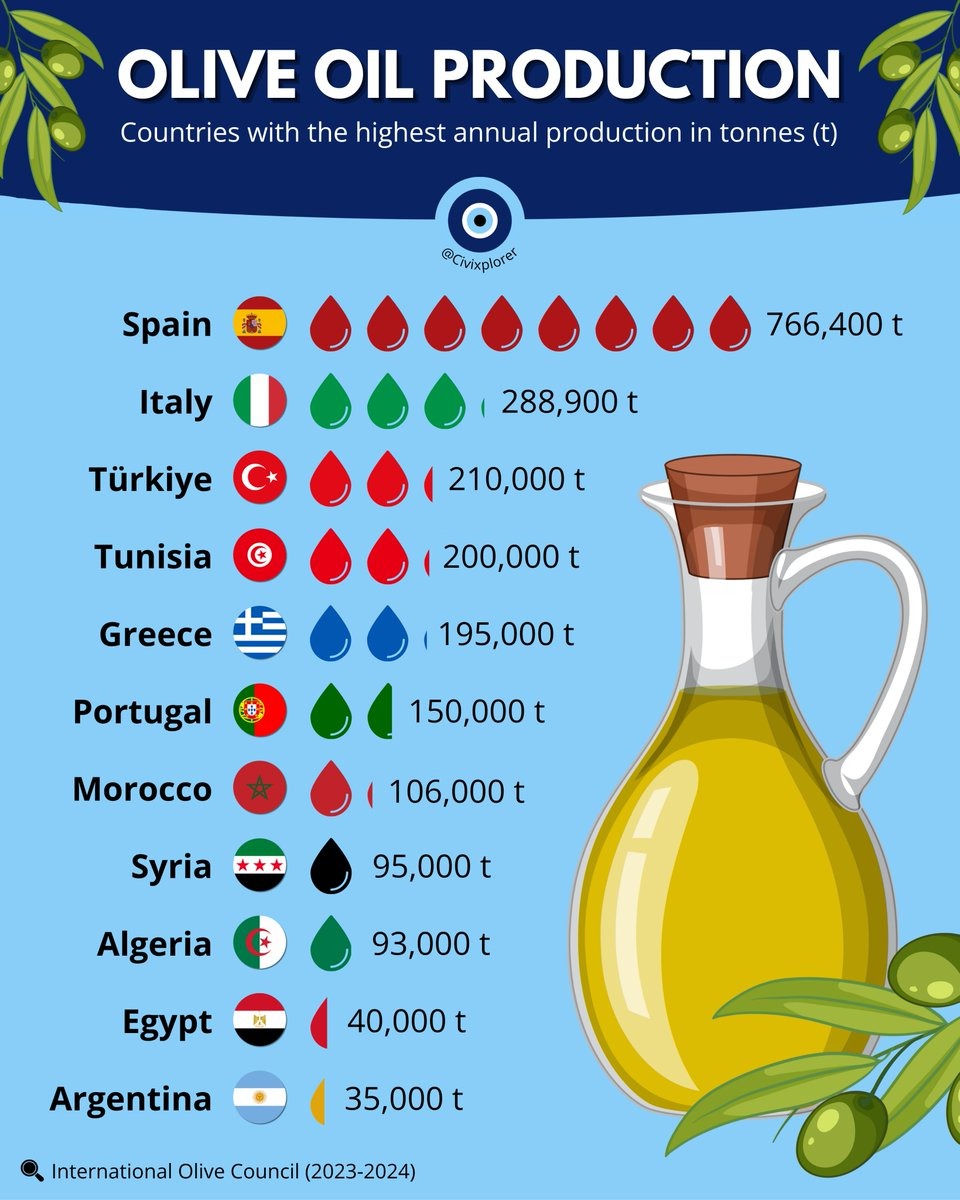
The ongoing drought across Spain stands as the principal factor behind the current olive oil price surge. As one of the largest olive oil-producing nations globally, Spain’s drastically reduced harvest - caused by months of extreme heat and minimal rainfall - has sharply curtailed olive oil availability in both European and international markets. This has intensified supply shortages, compelling consumers to pay more for what has long been a staple Mediterranean product. The interplay of limited supply and escalating demand has magnified price volatility, reinforcing the classic supply-and-demand imbalance now driving global markets.
Incredible to see the olive groves of Jaen, Spain. This one province produces around a fifth of the *entire* global supply of olive oil
— Secunder Kermani (@SecKermani) August 31, 2023
But a combination of drought & extreme heat has left many trees badly weakened... This years harvest looks set to be the worst in living memory pic.twitter.com/QYs41eXCwC
As prices have risen steeply, the shortage of olive oil has led to a noticeable decline in consumption, particularly in Spain, where demand has reportedly dropped by around 35%. Consumers are now scaling back their purchases, finding olive oil increasingly unaffordable compared to other cooking oils. The once-steady household consumption patterns are shifting as people seek alternatives or modify their cooking habits. This contraction in domestic demand not only highlights the growing accessibility gap for consumers but also underscores the broader economic strain caused by high inflation and food price increases.
Amid the turmoil, Australian olive oil producers are experiencing a windfall. Thanks to limited global supply, Australian growers are commanding record prices exceeding AUD $8 per litre, marking the highest levels ever recorded in the nation’s olive oil industry. This lucrative period presents a rare opportunity for Australian exporters, with demand from Europe - including Spain itself - now turning toward Australian supplies. For producers Down Under, this unique reversal of roles underscores how regional climate resilience and diversified production can translate into significant financial gains when global shortages arise.
The olive oil market’s volatility is not a new phenomenon. Previous spikes occurred in 1996, 2006, and 2015, each triggered by weather-related supply constraints. Yet, the 2023 price explosion stands out as the most dramatic in recorded history -over 40% higher than any previous price peak, and roughly double the magnitude of earlier surges. This extreme escalation reflects not just climatic hardship but a clear pricing bubble forming within the market, echoing the cyclical nature of commodity pricing.
The olive oil sector has long followed cyclical pricing patterns, typically alternating between low and high price phases roughly every decade. The current surge aligns almost perfectly with the predicted start of another 10-year cycle, occurring just three years into its anticipated timeline. Furthermore, a notable correlation has been identified between the Australian Food Inflation Index and the Global Olive Oil Price Index as reported by the International Monetary Fund (IMF). This connection illustrates the deep interdependence between food commodity pricing and global economic conditions.
While the IMF’s benchmark prices are denominated in USD, for the purposes of this analysis they have been converted to AUD to track the trend relative to Australian markets. These benchmark indicators -based on the world’s largest olive oil exporters -serve as a reliable gauge of overall market direction, confirming how global shortages and inflationary pressures move in tandem.
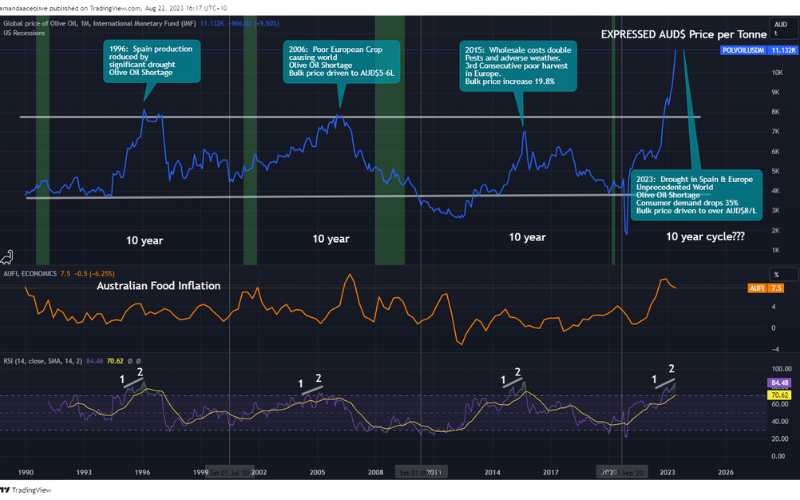 Global olive oil prices show a recurring 10-year cycle, driven by droughts, crop shortages, and rising production costs
Global olive oil prices show a recurring 10-year cycle, driven by droughts, crop shortages, and rising production costs
From a technical analysis perspective, the Relative Strength Indicator (RSI) is often used to measure price momentum and potential overextension in markets. On recent olive oil price charts, the RSI (represented in purple) indicates that prices have once again entered overbought territory - a level seen during previous speculative phases. Historically, such readings have preceded market corrections or reversals, suggesting that the current surge may not be sustainable in the long term.
Analysts caution that as the European olive harvest begins in September and October 2023, an influx of new oil supplies could help ease prices, though the timing and extent of this correction remain uncertain. Until then, speculative trading and limited inventory continue to support inflated market values.
The record-breaking olive oil prices of 2023, primarily triggered by Spain’s drought-induced production collapse, mark a turning point for the global olive oil economy. With consumer demand declining under the pressure of soaring prices and Australian producers thriving amid the scarcity, the industry is experiencing a dramatic rebalancing. Historical precedents, cyclical trends, and market indicators all point toward a complex, transitional period defined by volatility and uncertainty.
As the world’s producers, traders, and consumers adapt to these new market dynamics, one truth remains clear: olive oil - celebrated for its taste, health benefits, and cultural significance - continues to be at the mercy of both climate change and economic cycles. Stakeholders across the value chain must remain alert, flexible, and forward-thinking as the olive oil market navigates this extraordinary phase of transformation.
Other Sources
Introduction
For artisanal olive oil makers and table olive processors, investing in the right equipment can vastly improve efficiency and product quality. TENCO, an Italian manufacturer with roots in Liguria’s olive oil industry, offers a range of compact bottling and capping machines tailored for small to medium operations . These machines are designed to preserve the flavor and integrity of even the most delicate extra virgin olive oil during packaging . From vacuum filling machines that gently bottle oils without exposure to air, to pneumatic dosing systems for viscous olive pastes, and semiautomatic cappers for consistent sealing – TENCO’s lineup (available via The Olive Centre) covers the needs of boutique olive businesses. In this article, we provide an overview of key TENCO equipment models and their features that make them ideal for operations with smaller throughput.
The TENCO Enolmatic is a benchtop vacuum filler designed for small-scale production of oils, wines, spirits, sauces, and other liquids – including those with relatively high viscosity. This compact unit uses vacuum suction to draw product directly from a tank or drum into the bottle, which means the liquid never passes through an impeller pump or mechanical components. This gentle filling method helps maintain the oil’s organoleptic qualities (taste and aroma) by minimising oxidation and turbulence during bottling.
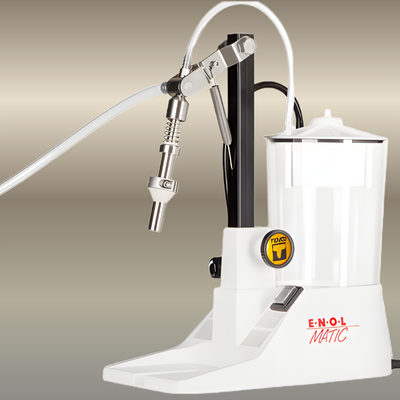

Practical example: Using the Enolmatic, a family olive farm can bottle a 200-litre batch (~266 bottles of 750 ml) of olive oil in just around 2 hours of work, with one person operating. In contrast to manual funnel filling, the vacuum system minimises air contact, preserving the oil’s fresh taste. The adjustable fill level means every bottle looks uniformly filled, which conveys professionalism. If the same farm also packs marinated olives in brine, they can swap to a jar kit and fill jars under vacuum, reducing mess and oxidation of the brine.
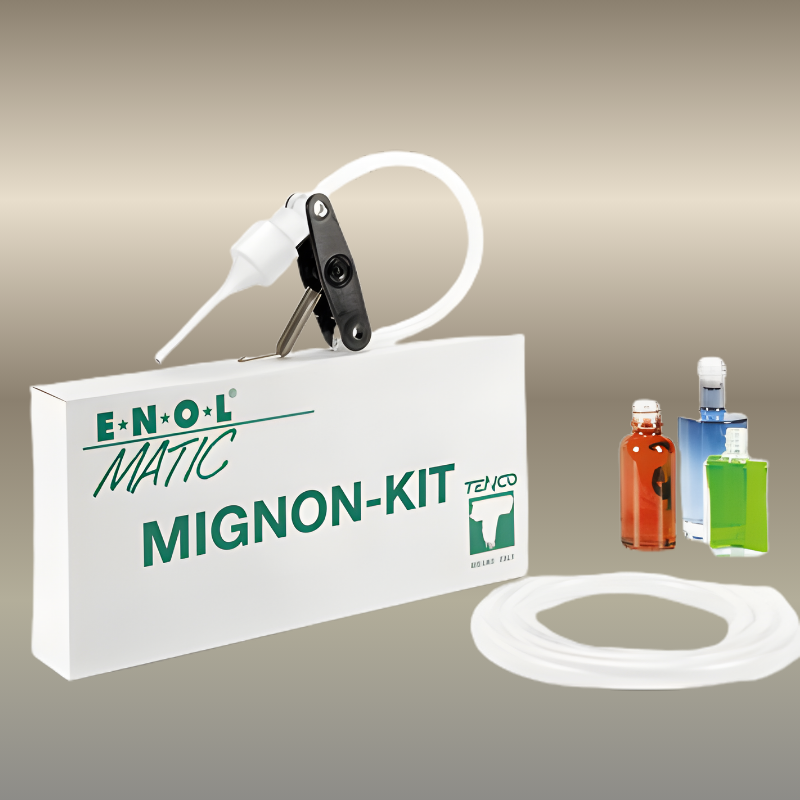
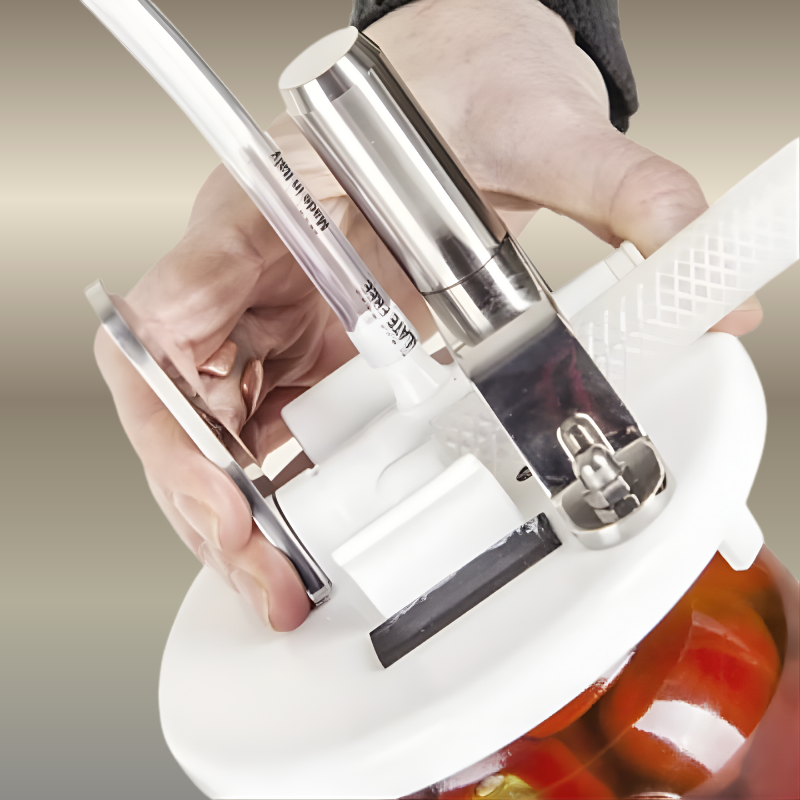

For producers who need a higher throughput but still want the benefits of vacuum filling, the TENCO Enolmaster offers an excellent solution. Essentially an upscale version of the Enolmatic, the Enolmaster features four filling heads (stainless steel) operating on the same vacuum principle. This allows parallel filling of 2 or 4 bottles at once, drastically increasing output while retaining a compact, bench-friendly design.
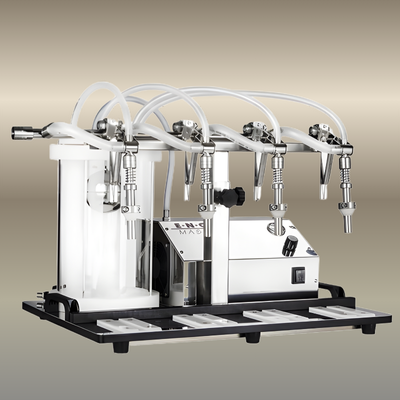
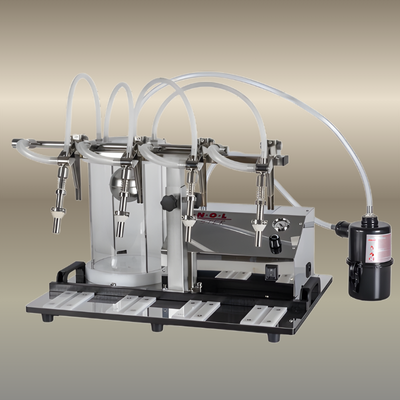
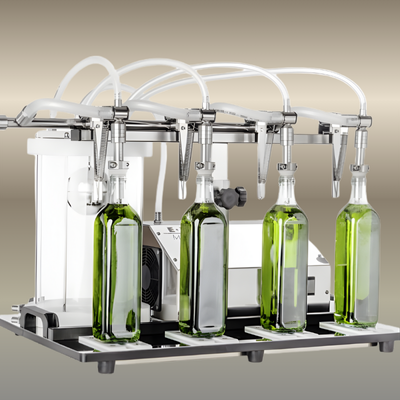
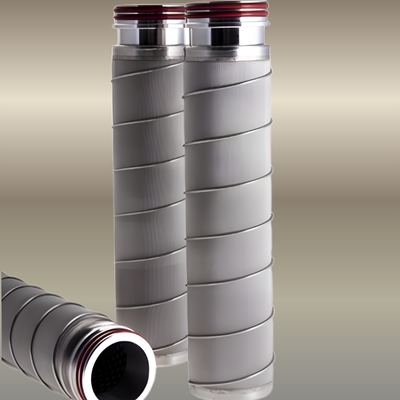
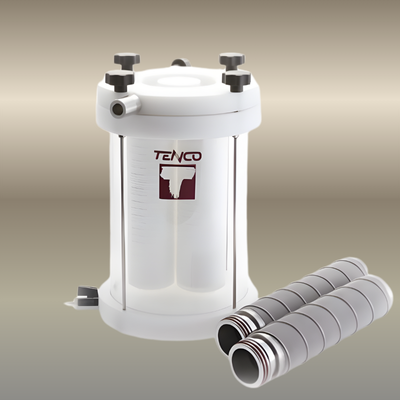
Not all olive-related products are free-flowing liquids. For thicker substances like olive paste (tapenade), olive jam, flavoured sauces, or even cosmetic products (olive oil soaps, creams), TENCO’s Doselite® pneumatic dosing machine is the go-to solution. The Doselite is a volumetric piston filler that uses air pressure to accurately dispense a pre-set volume of product, from as little as a few millilitres up to over a litre. It’s extremely versatile and food-safe, making it well-suited for artisanal producers who handle a range of product viscosities.
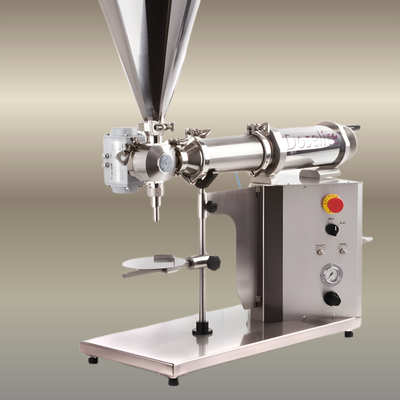
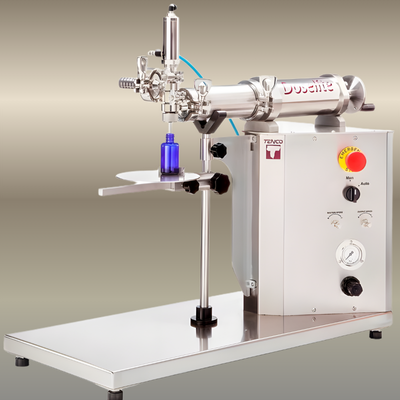
Practical example: A small olive producer makes an olive relish and packages it in 250 ml jars. Using the Doselite with a 30L hopper, they can set the dose to ~250 ml and fill jars one after another with foot-pedal activation. The ±1% accuracy means each jar is filled within ~±2.5 ml of the target, virtually eliminating the variance you’d get scooping by hand. With the pneumatic drive, the operator can maintain a steady pace without fatigue – e.g., filling hundreds of jars per hour with consistent weight. Afterwards, cleaning the machine is straightforward: tri-clamp fittings allow the entire product path to be taken apart without wrenches, so cleanup and changeover to their next product (perhaps a lemon-infused olive oil lotion) is quick. The machine’s precision and minimal waste help reduce product loss and ensure every customer gets a full jar with a professional appearance.

Dispensing valves
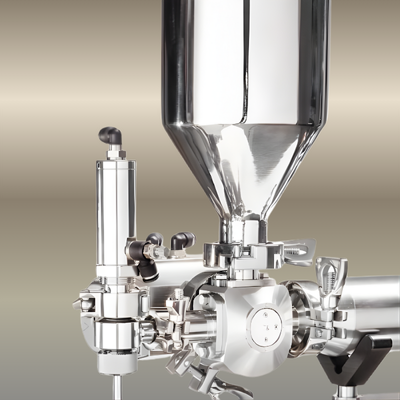
Dispensing valves
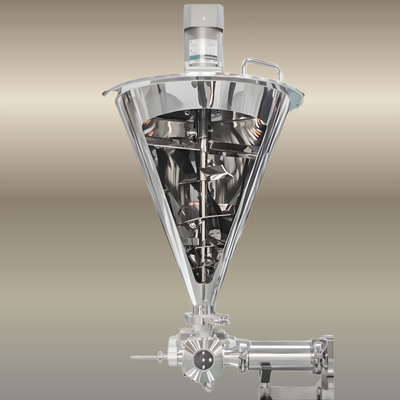
Mixing systems
Once olive oil or olives are filled into containers, the next critical step is secure capping. Hand-capping can be tedious and inconsistent – especially for metal caps that require proper torque or crimping. TENCO provides bench-top capping machines that give small producers a fast, reliable way to cap bottles and jars with professional results. These systems are compact and often pneumatic or electric, making them easy to fit into a small processing room. Below, we highlight two key capping solutions from Tenco and their features:
For olive oil bottles that use pilfer-proof aluminium caps (the type with a tamper-evident ring, often with an integrated pourer insert), Tenco’s descending head capping machine is ideal. This is a semiautomatic electric capper with a 4-roller stainless steel capping head that forms and tightens aluminium caps around the bottle neck thread in one motion. It’s the same style of closure seen on wine bottles (Stelvin® caps) and many olive oil bottles for a leak-proof, tamper-evident seal.
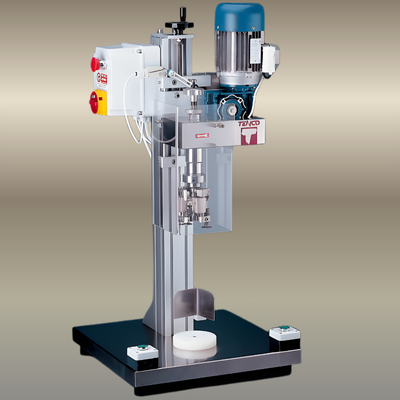

Practical example: A boutique olive oil producer uses the 4-roller capper to seal their 500 ml olive oil bottles with pilfer-proof caps (31.5 mm diameter with pourer inserts). An operator can comfortably cap a bottle in ~5 seconds – aligning the bottle, pressing the buttons, and then removing the sealed bottle – which translates to around 500 bottles/hour at full pace. This is a huge improvement over manually threading on caps and twisting with a hand tool. Moreover, every cap comes out evenly crimped and tightly sealed, preventing the slow drips or oxygen ingress that might occur with uneven hand capping. When the same producer has a run of pickled olives in jars to cap, they switch the capping head on the machine to the magnetic clutch chuck and adjust the height. Now they can cap twist-off jars just as efficiently – ensuring each lid is sealed to the perfect tightness, which reduces product spoilage and extends shelf life by maintaining the vacuum in the jar.
TENCO’s Easycap is a pneumatically-driven bench capper dedicated to twist-off metal lids (common on jars of table olives, jams, etc.) and plastic screw caps. If your operation involves jarring olives, tapenades, or sauces in glass jars with metal lids – or bottling oils/vinegars with plastic caps – Easycap provides a convenient, flexible solution. It’s entirely air-powered (no electricity), which is advantageous in food environments or where compressed air is readily available.
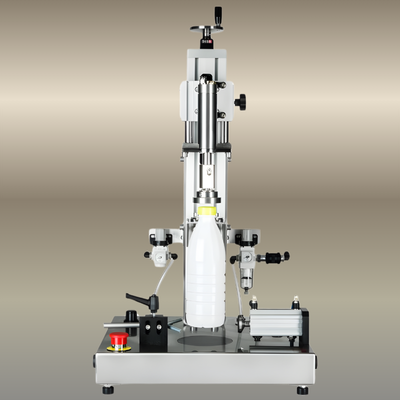
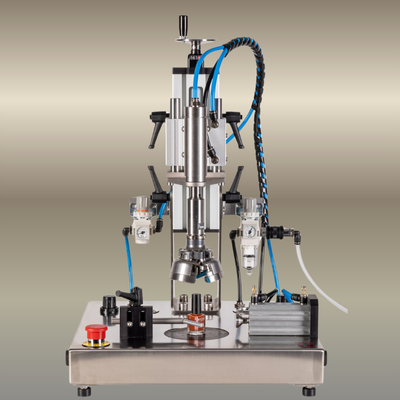
To summarise the discussed TENCO machines, the table below outlines their key specifications and recommended applications:
| Machine & Model | Type | Throughput | Key Features | Ideal Applications |
|---|---|---|---|---|
| Enolmatic (Vacuum Filler) | Single-head benchtop vacuum filler | ~150 bottles/hr (up to 250 for smaller bottles) | Gentle vacuum filling preserves oil quality; adjustable fill level; compatible with many bottle sizes. | Small olive oil producers, boutique wineries, and low-volume premium bottling. |
| Enolmaster (Vacuum Filler) | 4-head benchtop vacuum filler | ~500 bottles/hr (up to 600 optimal) | Four nozzles for high-capacity, no-drip system; stainless steel construction; adaptable with kits. | Medium olive farms, cooperatives, and expanding producers. |
| Doselite (Volumetric Doser) | Pneumatic piston filler | ~500–800 doses/hr (depends on thickness) | Precise 50–1300 ml dosing; handles liquid to thick pastes; food-grade 316L steel; fast cleaning. | Tapenades, sauces, pastes, farm cosmetics, dense olive products. |
| Descending Head Capper (4-Roller) | Semi-automatic electric capper | ~500–600 bottles/hr | Perfect pilfer-proof aluminium sealing; consistent torque; switchable heads for various cap types. | Olive oil bottlers using ROPP caps; producers needing multiple cap formats. |
| Easycap (Pneumatic Capper) | Semi-automatic pneumatic capper | ~500–600 containers/hr | Twist-off lids (38–110 mm) & plastic caps; torque-adjustable; fast mandrel swapping. | Jarred olives, antipasto makers, and producers avoiding electrical equipment. |
(All throughput rates are approximate and assume an experienced operator and continuous operation. Actual rates may vary with product viscosity, fill volume, and operator pace.)
Outfitting a small or medium olive processing operation with TENCO’s specialised equipment can significantly boost efficiency, reduce waste, and improve product consistency. These machines bring industrial-level precision to the artisanal scale: vacuum fillers that protect oil quality while speeding up bottling, piston dosing machines that deliver exact portions of savoury olive products, and semiautomatic cappers that ensure every bottle and jar is sealed tight and secure. Importantly, they are accessible in terms of size, cost, and ease of use – designed with the professional grower/producer in mind rather than a large factory. By adopting such equipment, even a family-run olive grove can achieve a streamlined packing process: imagine bottling and capping your extra virgin olive oil in the morning, with minimal spills or rejects, and confidently offering a shelf-stable, beautifully presented product to customers.
TENCO’s range (available through The Olive Centre) covers each step from filling to capping, and each machine is engineered to handle the nuances of olive products – from preserving delicate flavours to handling viscous textures. This integrated approach helps artisanal producers maintain quality control and scale up throughput without sacrificing the handcrafted appeal of their products. In short, whether you produce boutique olive oil, jarred olives, or related gourmet items, TENCO’s bottling and capping equipment provides a smart investment to elevate your operation’s productivity and professionalism. With these tools, you can save time, ensure consistency, and focus on what you do best: creating excellent olive products.